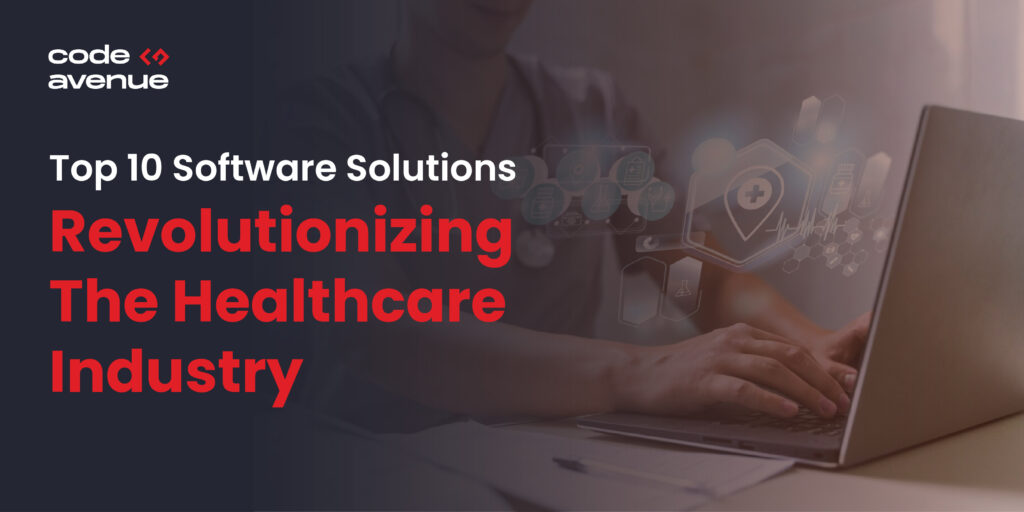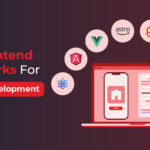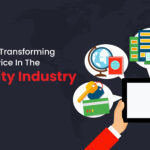Introduction
Modern healthcare systems are shifting toward digital transformation through innovative software solutions that deliver enhanced operational efficiency and better patient outcomes. MarketsandMarkets predicts that the healthcare IT market will achieve $821.1 billion in revenue in 2026 through a 20.3% annual growth rate.
The market size of digital health is expected to reach $197.90 billion by 2025. Medical providers are depending heavily on telehealth platforms, AI-based diagnostic tools, and secure data management solutions because of escalating customer requirements. Medical institutions worldwide must start investing in advanced healthcare software systems.
Because more than 95% utilize electronic health records systems telemedicine has grown 154% since the COVID-19 pandemic began. Some of the advanced healthcare delivery models created by Dr Gawande, Berwick, shetty, etc. are known all around the world and must be taken inspiration from.
List Of Top Software Solutions For Hospital In The Year Of 2025
- The Electronic Health Records (EHR)
The Electronic Health Records (EHR) software transforms patient medical information into digital form including whole family healthcare system so healthcare providers gain immediate access to basic health records with prescribed medications and treatment plans. These health and safety software solutions make data more precise through digital records and enables seamless sharing among providers.
Key Benefits:
- Cloud-based storage for increased user accessibility
- AI-driven analytics to improve patient outcomes
- Voice recognition feature for easy search and diagnosis
AI-powered EHR solutions are transitioning into automated medical documentation systems that predict patient health decline which enhances both diagnosis quality and treatment design applications.
- Telemedicine Software
Telemed software allows patients to choose video calls and messaging as well as AI symptom checkers for remote doctor visits since they prefer this approach by 60%. A modern telehealth system combines wearable devices alongside AI-powered chatbots for immediate health assessment capabilities and offers mytelemed customized features.
Key Benefits:
- Reduces the amount of overload and delayed patient care
- Increased accessibility to all healthcare specialists and easy telemed login
- Affordable and cost-effective healthcare app for all patients
The telemedicine sector will reach $459 billion in market value by 2030 because society requires remote and health insurance software solutions.
- Hospital Management Systems (HMS)
Hospital Management Systems offers a united healthcare app containing procedures for administrative work with financial processing record keeping and supply chain management functions in a single platform. Automated scheduling together with medical billing along inventory tracking has resulted in hospital efficiency enhancements by 30% and offers optimum healthcare.
Key Benefits:
- AI-powered decision-making system for better results
- Automated processes to manage healthcare staff and patients
- IoT-powered asset tracking management system for hospitals
AI-powered HMS generates forecasts that enable more efficient staff deployment according to location for faster patient care services such as sydney health app designed especially for their civilians.
- AI-Powered Diagnostic Software
Through AI-driven tools like IBM Watson Health and Google’s DeepMind physicians can detect early diseases and deliver more accurate diagnoses with a 30 to 40% improvement. These solutions create major changes in diagnostic practices of medical imaging, pathologic examinations, and predictive analytical activities.
Key Benefits:
- Enhanced image interpretation with AI-powered radiology
- The system generates precise pathology reports through automation
- Medical image study with deep learning approaches deliver accuracy
Forecasting reveals that AI-powered diagnostic solutions will transcend $67 billion in revenue by 2027 and transform how doctors identify diseases and outline patient treatments.
- Medical Imaging Software
Medical imaging software helps imaging healthcare specialists enable better analysis of CT scans alongside MRIs and X-rays for radiology professionals as well as those in the cardiology and oncology fields. AI solutions through real-time diagnostics enable healthcare experts to detect anomalies automatically and change healthcare data breach to be detected instantly.
Key Benefits:
- Enhanced visualization of reports with 3D imaging
- AI-powered disease detection offers a faster diagnosis
- Cloud interoperability delivers smooth data-sharing capabilities
The medical imaging AI market demonstrates projected expansion to $8.4 billion by 2027 which will enhance combined medical diagnosis and healthcare operational effectiveness.
- Wearable Health Tracking Software
The worldwide wearable healthcare market reached over $37 billion in 2023 because medical devices featuring Fitbit, ECG monitors, and Apple Watch which is a type of steps tracker help people track their vital signs in real-time. Chronic condition patients can leverage these solutions through health monitoring tools like fitness tracker watch which provide them with early detection of potential risks.
Key Benefits:
- AI-assisted beacon health and fitness solutions to increase better healthcare outcomes
- Patient surveillance systems help monitor chronic illnesses through the “My Activity” feature
- EHR systems easily integrate into all types of health devices
AI-integrated wearables use their detection capabilities to identify heart irregularities and forecast strokes before transferring emergency notifications to decrease death rates.
- E-Prescription Software
E-prescription software offers a mychart spectrum feature along with preventing writing errors during prescription processes while boosting medication distribution efficiency and lowering fraudulent drug activities. The adoption rates of E-prescription software grew 300% throughout the previous five years which improves both prescription precision and care quality.
Key Benefits:
- Features like corewell health mychart reduced errors in prescription and diagnosis
- Instant communication channel between all types of specialists
- Medicine recommendations powered by ML along with the pediatric healthcare alliance
The field currently adopts AI-empowered advanced e-prescription systems to recognize adverse drug reactions and create individual treatment approaches.
- Healthcare CRM Software
Research shows Healthcare Customer Relationship Management (CRM) software boosts patient engagement by 40% through automated appointment alerts and customized communications and follow-up capabilities. AI-powered CRMs are included among the best united healthcare apps to improve patient experience and decrease administrative workloads.
Key Benefits:
- Behavioral health software solutions are AI-powered for useful insights
- Automatic marketing system with continuous patient follow-ups
- A HIPAA-compliant system that offers safe messaging
Professional CRMs powered by AI technologies achieve predictive analyses that evaluate patient sentiments along with appointment no-show forecasts resulting in 30% decreased administrative work.
- Blockchain-Based Health Data Security
The rising number of cyberattacks targeting healthcare app development has forced healthcare providers to adopt blockchain technology as their primary defense solution for medical information security in 2023. Through blockchain technology patients benefit from tamper-proof records which provide secure data sharing and ensure compliance with data privacy laws.
Key Benefits:
- Fraud prevention system with unalterable patient data
- Smart contracts for safe and automatic document protection
- Safe and strong teamwork options between different specialists
Research indicates that the blockchain healthcare market will achieve $14 billion by 2028 because healthcare providers need decentralized secure record-keeping systems.
- Virtual Reality (VR) for Medical Training and Rehabilitation
The combination of VR technology creates well apps that offer dramatic improvements in both medical education and patient recovery processes. Various types of VR applications transform healthcare training and therapy by offering immersive surgical practice along with cognitive therapy approaches with simple wellness living login processes to provide a seamless experience.
Key Benefits:
- Immersive medical training for surgical precision
- Mental health apps for cognitive therapy of patients
- Post-surgical rehabilitation for improved patient outcomes
Diminishing patient dropouts by 70% and targeting PTSD treatment and physical therapy remain key drivers for the VR healthcare market to grow to $6.2 billion by 2029.
What Are The Future Trends: How Technology is Reshaping Healthcare
It is hard for any top-rated healthcare app development company to keep up with the rapid transformation because emerging technology advances the realm of innovation. Medical technology will continue to develop by the following changes in a 10-year period.
- AI-Driven Precision Medicine – Delivers customized treatment protocols through genetic and lifestyle information analysis to transform healthcare delivery.
- Decentralized Healthcare Systems – Patients will regain control of their healthcare information through blockchain which improves medical data protection and ease of access.
- 5G-Powered Telemedicine – Ultra-fast connectivity allows doctors to perform real-time remote surgeries and give AI-assisted consultations across the entire world.
- Digital Twin Technology – Doctors can enhance their treatment accuracy through this by using virtual patient models to conduct simulations first.
- Nanotechnology in Diagnostics – Artificial biosensors together with nanorobots enable monitoring of diseases through real-time cellular assessments.
Conclusion
Healthcare transforms AI while blockchain technology and telemedicine systems lead to patient-centered care that both benefits from data sophistication and maintains security levels. Healthcare software demand grows steadily so developers and businesses need to understand current trends to develop creative solutions which enhance healthcare delivery processes.
Are you seeking to develop advanced healthcare software? Partner with Code Avenue to access mobile solutions that enhance scalability while guaranteeing security and preparing you for future market positions in digital healthcare competition.
FAQs
How do hospital management systems improve efficiency?
Hospital Management Systems (HMS) control administrative workloads and schedule patients while they optimize financial accounts ensure inventory order and enhance employee management operations by deploying AI.
How is software transforming the healthcare industry?
Healthcare software tools make patient treatment better while they optimize operational flow and allow remote visits maintain protected medical records through blockchain technologies and use artificial intelligence to find diseases early.
What are the key benefits of AI in healthcare?
The implementation of AI diagnostics coupled with workflow optimization and AI-enhanced predictive elements automated medical imaging and patient-specific treatment designs drive better health results for patients.
What role does blockchain play in healthcare?
Blockchains protect patient data by improving security while stopping fraud and ensuring seamless data exchange through permissions that fulfill the standards of HIPAA and GDPR regulations.












They were willing to walk me through their ideas and provide suggestions when I wasn't sure about something.
Marcus Gitau Founder, Kumea, Agriculture Industry